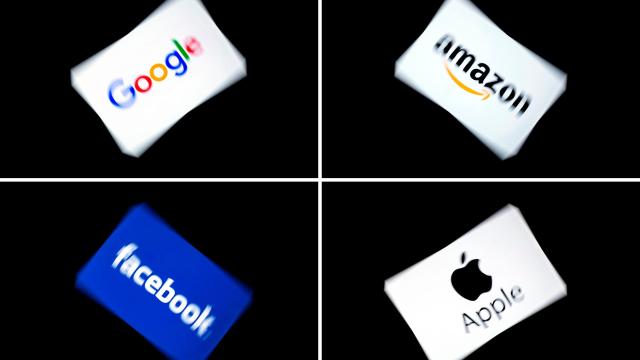Pour one out for corporate tech lobbying. The Internet Association, the once towering D.C. behemoth that turned policy water into wine for the likes of Facebook, Amazon, and Google, is set to dissolve this week following months of reduced relevance and diminished support from its increasingly at-odds members.
That’s according to a recent Politico report that cites two unnamed sources claiming the storied firm would dissolve amid growing financial straits. IA staff reportedly received an urgent email on Tuesday alerting them of an all-hands-on-deck meeting set for the following day. A separate report from Axios claims IA board members met to vote on dissolving the company, with the kill decision already made beforehand.
“What was once a leading voice for tech companies is fading into obscurity with barely a whimper and hardly anything to show for itself,” a former member told Axios.
The IA did not immediately respond to Gizmodo’s request for comment.
The trade group was formed back in 2012 with the stated goal of protecting, “the freedom and innovation of the Internet.” That broad remit translated to a variety of policy pursuits, ranging from support of net neutrality to the creation of a controversial 2018 FOSTA-SESTA law that was arguably more favourable to tech companies.
Though experts have warned the IA had been losing some of its political sway for the better part of 2021, the alleged dissolving occurred rapidly following Microsoft’s decision last month to part ways. At the time, the IA’s SVP of Global Communications and Public Affairs Christina Martin appeared to hold out hope, telling Gizmodo, the IA had “every hope they [Microsoft and Uber] may return in the future.” But other partners like Google, Amazon, and Meta had already planned to significantly cut back their spending, which likely made the Microsoft departure all the more devastating.
The main problem plaguing the IA in recent years says less about the lobbying group itself and more about the diverging interests and needs of U.S. tech companies. In an era marked by constant consolidation, reinvigorated government regulators, antitrust attacks, and the dogged pursuit of super apps, there’s less unifying glue connecting the biggest tech companies to one another. Firms like Apple and Facebook, for example, differ widely on their philosophy towards data privacy, while others still like Microsoft and Amazon have shown a greater interest in carving out explicit partnerships with the U.S. military.
Mark Zuckerberg’s Meta, which has drawn the lion’s share of criticism from regulators and the public in 2021, would likely demand a more aggressive lobbying response than other, less controversial members. Increasingly, many or all of these firms will find themselves competing against one another in some capacity.
That doesn’t mean the individual tech companies themselves are tightening their own lobbying wallets. On the contrary, Meta spent $US5.1 ($7) million in lobbying in the third quarter alone, the second most it spent in any quarter in 12 years according to Open Secrets. Others like Amazon and Alphabet also rolled out their piggy banks. That spending could increase even further as Lina Khan’s FTC prepares more regulatory action and as the public’s opinion of certain firms continues to sour. To that last point, some 56% per cent of U.S. adults polled by Morning Consult said they supported government regulation of social media companies, an increase of 4% compared to when that same question was asked in October. Only 40% of respondents in that poll said they had a favourable view of social media platforms.
In a way, it only makes sense that an era set to be defined by the competing interests of a handful of unfathomably large and valuable tech giants rides on the death of a group that once heralded itself as the “unified voice of the internet economy.”
